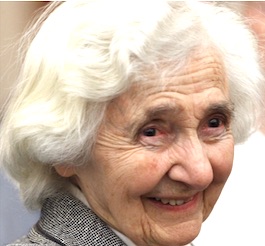Remembering My Friend, Lily von Hildebrand
- MARY HEALY
Alice von Hildebrand, who died Jan. 14 at the age of 98, exuded gratitude for all of God’s gifts.
 I first met Alice von Hildebrand (known to her friends as Lily) in 1987, when she came to Franciscan University of Steubenville to give a talk on the privilege of being a woman. She began her talk by suggesting, with her incomparable charm, that the men in the audience might want to reconsider whether they wanted to stay, since by the end of the evening they would be desperately envious of women.
I first met Alice von Hildebrand (known to her friends as Lily) in 1987, when she came to Franciscan University of Steubenville to give a talk on the privilege of being a woman. She began her talk by suggesting, with her incomparable charm, that the men in the audience might want to reconsider whether they wanted to stay, since by the end of the evening they would be desperately envious of women.
Her presentation was witty, full of rich insight, and deeply inspiring. Afterward, some of the female students in the audience went back to their dorms and threw away articles of immodest clothing — not because of any rules, but because they had been captivated by the vision she imparted of the beauty and dignity of true femininity.
It was the same wit and charm that von Hildebrand used to potent effect in her 37 years as a philosophy professor at Hunter College in the Bronx, a dogmatically secular environment. Her students would often come into her courses spouting relativistic platitudes.
If a student asked a question like "Whose truth?" with her sweet smile professor Jourdain (professor von Hildebrand after her marriage to eminent philosopher Dietrich von Hildebrand) would thank the student for raising the point. She would then proceed to demolish their presuppositions and demonstrate the existence of objective truth.
Once, a student belligerently accused her of introducing Christianity into her philosophy course. "I'm afraid you've committed an anachronism," she replied, catching him off guard. "All my arguments are based on Plato and Aristotle, who lived centuries before Christ."
The college administration, unhappy with her successes, blocked her academic promotion at every turn and assigned her the most undesirable evening sessions, forcing her to drive (or be driven by her husband) through the Bronx in the dark. Their attempts at marginalization failed: Her courses were always packed. Students jaded by nihilism discovered for the first time a reason for living, a truth they could lay hold of.
Without ever speaking directly of faith in the classroom, von Hildebrand (along with her husband, who taught at Fordham University) brought dozens of young students to faith in Christ and the Church, becoming godparents to many, including such luminaries as philosopher Rhonda Chervin and Dom Raphael Diamond, prior of the Carthusian monks of Vermont.
Lily was a fierce defender of objective truth outside the classroom, as well, through her books, articles and countless radio and TV appearances, including many EWTN interviews with her friend and ally Mother Angelica. It was said that with her quick repartees Alice von Hildebrand was the only person capable of reducing even Mother Angelica to silence.
As a young editor at Sophia Institute Press, I worked with Lily on her book By Love Refined: Letters to a Young Bride, in which she distills her wisdom and practical advice on how to have a happy marriage. She wrote the book using word-processing software on a laptop, at a time when such things were new. At one point, with a few clicks she somehow accidentally deleted the entire manuscript and then "saved" the empty file. There were no backup copies. She faced this severe blow with grace and serenity, rewriting the entire book.
Their attempts at marginalization failed: Her courses were always packed.
My most memorable experience with Lily was in 1988, when she and I went to New York City to attend a lecture by Cardinal Joseph Ratzinger (later Pope Benedict XVI), then prefect of the Congregation for the Doctrine of the Faith (CDF). It turned out to be a famous lecture, "Biblical Interpretation in Crisis."
Less well known is what occurred in the middle of it. The CDF had recently published guidelines on the pastoral care of homosexual persons, angering some Catholics because of its reaffirmation of traditional teaching on the immorality of homosexual acts. In the middle of the cardinal's erudite lecture on biblical interpretation, gay protesters planted throughout the audience suddenly stood up, holding pink triangles and shouting in unison, drowning out the soft-spoken Ratzinger.
It was my first and only experience of mob intimidation. The cardinal paused, while the audience sat stunned and helpless — except for one 98-pound woman of twisted steel sitting next to me. She alone, of the hundreds of people in the room, reacted by standing up herself and politely but firmly rebuking the protesters, demanding that they do the courtesy of allowing the cardinal to finish his talk. Though her voice did not carry far, she brought air back into the room, as if breaking the spell.
Eventually, the protesters were removed by security. For me, it was an unforgettable lesson in the powerful effect of even a single person standing up to intimidation. Lily often spoke proudly of how her husband, Dietrich, one of the few German intellectuals who spoke out fearlessly against Nazism in the 1920s and '30s, was at the top of Hitler's most-wanted list and had to flee Austria for his life. She was a fitting match for him.
Although Dietrich died in 1977, for many years afterward, Lily fondly reminisced about their life together in the little apartment in New Rochelle. They were quite a pair — two razor-sharp minds educated in the best of European Catholic culture, but a bit ham-fisted when it came to practical matters. They would discuss Dante and Wagner, Shakespeare and Edith Stein.
Sometimes while lying in bed at night they would play a game: One would hum a few notes, and the other would immediately tell which symphony or opera it was from, by which composer. Yet they both had trouble using a can opener. One time, Lily said, for weeks Dietrich was concerned that his eyesight had been deteriorating; he needed to make an appointment with the optometrist. It was a friend who pointed out that his eyeglasses badly needed cleaning. Problem solved.
Sometimes while lying in bed at night they would play a game: One would hum a few notes, and the other would immediately tell which symphony or opera it was from, by which composer.
For many years Lily spent her summers at my parents' farm, then my sister's home, in New Hampshire, driving up from New York in her little blue Volkswagen "Bug." On one of the first summers, she taught a course on Plato in our dining room for about a dozen interested friends and neighbors. (Because of the assorted children on the premises, it was perhaps understandable that some neighbors heard that our guest was giving a class on Play-Doh.) It was an exhilarating course in which she brilliantly expounded the dialogues of Plato while sharing her other great intellectual loves, the Danish philosopher Soren Kierkegaard and, of course, her beloved husband, Dietrich. Whenever she spoke about him, her face would glow.
She did have a knack for captivating an audience, no matter what their age. One time when I was heading over for a chat with Lily, my 6-year-old nephew insisted on coming with me, despite my warnings that he would be bored. For an hour and a half, as she waxed eloquent on the theology of the body, the objectivity of truth and the gift of faith in Christ, he sat in rapt attention.
Lily would often be seen walking along the gravel road, praying the Rosary or simply contemplating the beauty of creation. Whenever she had a chance, she would commandeer someone, taking him or her by the arm to walk with her and discuss philosophy or listen to humorous anecdotes of her career at Hunter.
Several of the neighbors became her close friends. Always a joyful personality, unless someone was suffering, Lily exuded gratitude for all of God's gifts, especially her friends and family. Fond of taking a small glass of red wine with dinner, she was ecstatic just looking at it and savoring the aromatic bouquet before taking a sip. In her last years, gratitude was always on her lips.
One friend, Brother Joe Donovan of the Brotherhood of Hope, visited Lily in New Rochelle just a few days before her death. Confined to a chair but sharp as ever, she said to him, "You know, you must turn to God and say, 'Without you I can do nothing!' And you rejoice about it. Rejoice that you are helpless! We should not be scared, because he is there. Without him I can do nothing, but with his help I can go over a wall!"
Lily von Hildebrand, intrepid warrior for truth, devoted wife and affectionate friend, has indeed, by God's grace, gone over the thin wall that separates time from eternity, reunited at last with her beloved husband and with him who is Truth itself.
 This is Meaghen Gonzalez, Editor of CERC. I hope you appreciated this piece. We curate these articles especially for believers like you.
This is Meaghen Gonzalez, Editor of CERC. I hope you appreciated this piece. We curate these articles especially for believers like you.
Please show your appreciation by making a $3 donation. CERC is entirely reader supported.

Acknowledgement
 Mary Healy. "Remembering My Friend, Lily von Hildebrand." The National Catholic Register (January 18, 2022).
Mary Healy. "Remembering My Friend, Lily von Hildebrand." The National Catholic Register (January 18, 2022).
Reprinted with permission from The National Catholic Register
photo: Courtesy photo / Hildebrand Project
The Author
 Mary Healy is professor of Sacred Scripture at Sacred Heart Major Seminary in Detroit. She is the author of Healing: Bringing the Gift of God’s Mercy to the World, Scripture, Mercy, and Homosexuality, Deliverance Ministry, and co-author of The Spiritual Gifts Handbook: Using Your Gifts to Build the Kingdom. Her web site is here.
Mary Healy is professor of Sacred Scripture at Sacred Heart Major Seminary in Detroit. She is the author of Healing: Bringing the Gift of God’s Mercy to the World, Scripture, Mercy, and Homosexuality, Deliverance Ministry, and co-author of The Spiritual Gifts Handbook: Using Your Gifts to Build the Kingdom. Her web site is here.




